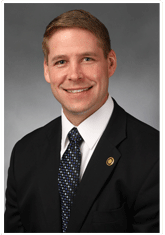JEFFERSON CITY — Many of you may have heard of an issue regarding the Missouri Department of Revenue (DOR), involving the collection and storage of sensitive data, the potential misuse of CCW (concealed carry) information, and the possibility that the information you bring to a fee license office is shared with entities outside the state.
This ordeal started last summer when a constituent sent us a request to help with getting his driver’s license renewed. He didn’t understand what documents he needed to bring. We asked, via email, for a response from DOR. In DOR’s response, we were told what the gentleman, as well as all citizens requesting certain licenses, needed to bring, which included proof of residence, citizenship and any name changes. In addition to that, the email warned us that, in the near future, all of those documents would be scanned and stored.
We were immediately taken aback by the fact that DOR was going to collect, scan and store this personal and private information. My immediate reaction was an honest concern for my constituents’ privacy. Any government database with that much information is a prime target for hacking and identity theft. In researching this matter, we found, for instance, that South Carolina had a driver’s license database hacked and more than three million people had their information placed at risk.
Based on my concerns and staff research of legislation in other states, I filed Senate Bill 252 in January. SB 252 would prohibit DOR from collecting, scanning and storing supporting documents. It also requires DOR to purge any scans they already had on file.
In late February, the Senate Transportation and Infrastructure Committee held a hearing on SB 252. By then, rumors already began to spread that the situation involving DOR was even worse than we expected. Allegations included that DOR was trying to implement portions of the federal Real ID Act this Legislature had banned, that federal Department of Homeland Security dollars were involved, and that collected data was going out of state and possibly to the federal government. These issues are an even bigger concern because DOR handles concealed carry information, which goes on your driver’s or non-driver’s license.
In preparation for that hearing in February, I met with officials from DOR, including the director of the department. At the time, I was satisfied they were being open and honest with their answers. Based on that meeting, I made no changes to the bill, assuming that the rumors were not true. Unfortunately, it seems there may be some truth to those allegations, and it is clear the director misled me and left out important information.
Since the hearing, the bill unanimously passed out of committee. The House also had a hearing on a companion bill to SB 252, and Senate Appropriations Committee Chair Sen. Kurt Schaefer held a hearing, challenging the DOR director and others on specific facts. As a follow-up, Sen. Schaefer issued a subpoena for background documents. At each step, we are finding more and more problems in the new system devised by DOR. As such, we are adding new sections to SB 252.
Now that the background documents requested through the subpoena are filtering in, we hope to hear SB 252 on the Senate floor soon. I will offer a substitute which, in addition to the original language, would ban the use of biometrics to scan your pictures and prohibit the creation of any list of CCW holders. I also expect several amendments, including one which would move CCW card responsibility to the county sheriff, where the application for concealed carry is originally made.
Finally, either the director of DOR or the governor could end the offending program at any time. Why they insist on moving forward with a program that is so universally controversial (and violates several state statues) is beyond me. The governor, in fact, has made little to no formal comment at all on this issue to date, sadly leaving his recently appointed department director out in the cold. Just this week, he finally answered a question and flippantly blew off the valid concerns by denying there was some “magical database” to which the information was saved. It is time the governor listens to his constituents and acts to protect Missourians’ privacy concerns.
Visitors
This week, we were happy to host visitors from the district, including Missouri S&T Alumni Jim Foil and Michael McMenus, and Katie Steen from the Missouri Cattlemen’s Association. |



